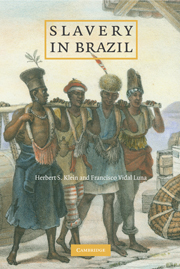Preface
Published online by Cambridge University Press: 05 June 2012
Summary
In recent years, there has been an outpouring of studies on the institution of slavery and the role of Africans and their descendants in Brazil. The earliest work on slavery in Brazil and the Afro-Brazilian experience was much influenced by anthropologists, whereas the more recent studies have seen an impressive participation of economists and sociologists along with the ongoing work of historians. Just as U.S. scholars were much influenced by the work of Brazilians in the 1950s and 1960s, for example, today Brazilian scholars are very aware of the new work done in the United States in the past four decades. Although the Brazilians have incorporated many of the North American debates about slavery in the United States, they have also developed a new set of questions about slaveholding and its distribution in the population as well as the nature of marriage and family among slaves. In fact, one could argue that the Brazilian historians and economists are doing more studies on their institution of slavery than is now occurring in the United States, despite the imbalance in the size of the historical profession in the two countries.
Ever since 1988, the centenary of abolition in Brazil, there has been an outpouring of new studies in theses, articles, and books. This has been the work of several distinct regional Brazilian schools of historical analysis.
- Type
- Chapter
- Information
- Slavery in Brazil , pp. ix - xiiPublisher: Cambridge University PressPrint publication year: 2009



